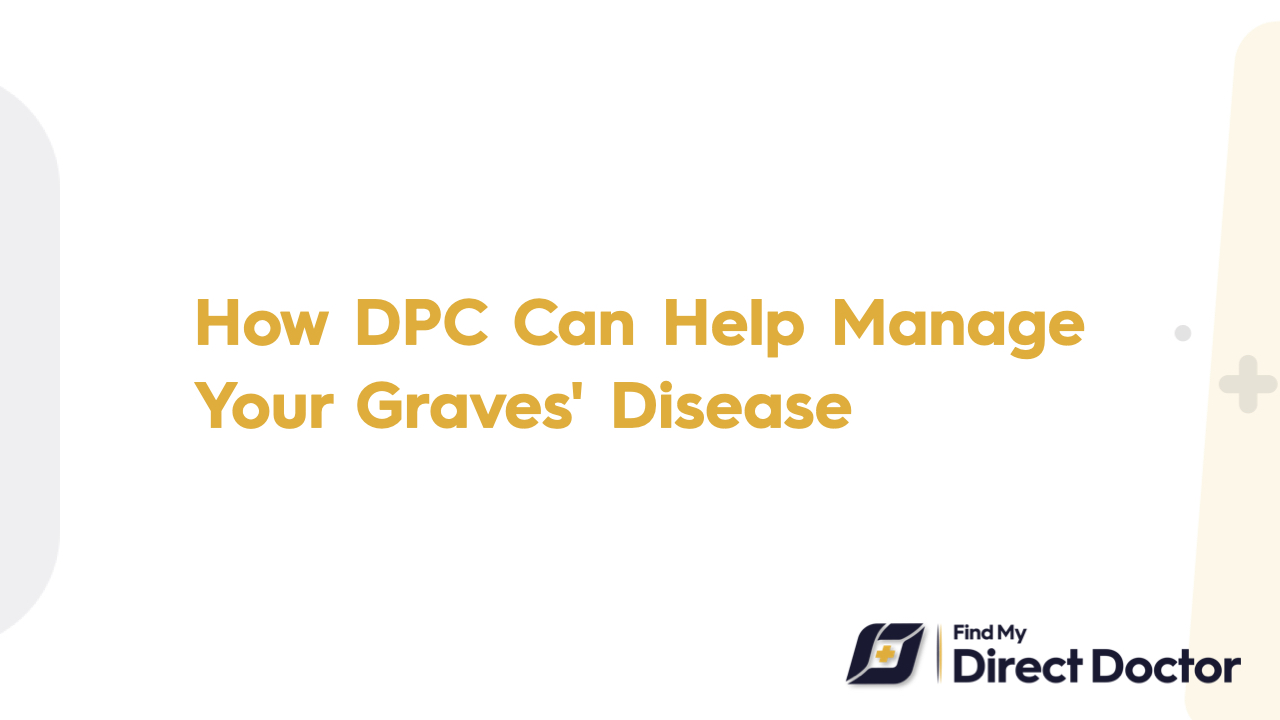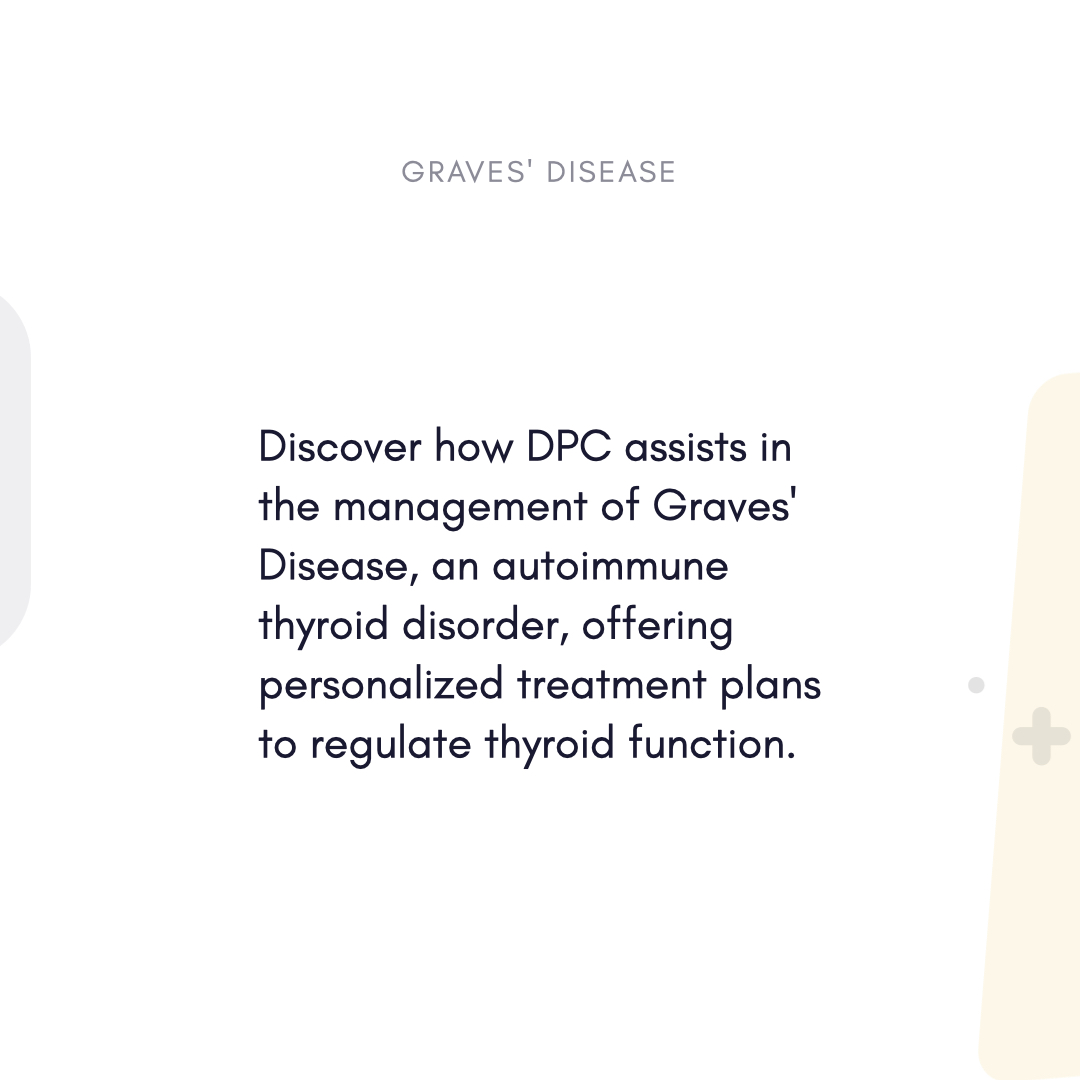Graves’ Disease and Direct Primary Care (DPC): Precision Care for Thyroid Balance
Affected 1 in 200 individuals, Graves' disease—an autoimmune condition causing hyperthyroidism—causes symptoms including rapid pulse, weight loss, anxiety, and thyroid eye disease. Designed with flat monthly rates, Direct Primary Care (DPC)—a membership-based model—offers customized, easily available treatment to control this complicated illness. DPC helps stabilize thyroid function, prevent complications, and enhance quality of life by combining fast testing, individualized treatment, and close patient-provider relationships.

Gaining Knowledge of Graves' Disease
- The thyroid gland is overstimulated by autoantibodies, which causes too high hormone production.
- Symptoms:
- Physical: Palpitations, heat sensitivity, tremor, Graves' ophthalmopathy—bulging eyes.
- Emotional: Anxiety, insomnia, mood swings.
- Diagnosis:
- Low TSH, high T3/T4 blood tests; thyroid antibodies (TRAb); ultrasonic diagnosis.
- Untreated cases run across:
- Heart failure, osteoporosis, or thyroid storm.
How DPC Improves Graves' Disease Management
How DPC Improves Management of Graves' Disease
-
Fast Diagnosis and Constant Surveillance:
- Thyroid Panels with Same-Day Accuracy: Internal TSH, free T4, T4 testing for a rapid diagnosis.
- Monitoring thyroid levels every 4–6 weeks during treatment to match American Thyroid Association (ATA) recommendations for strict control.
-
Customized Plans of Action:
- Medications for Antithyroidism: Start methimazole, or propylthiouracil (PTU), with dose changes depending on lab findings and side-effect profiles.
- Good Decision-Making: Informed talk closely about ATA-recommended choices (thyroidectomy, radioactive iodine, or ATDs) to make sure patients grasp risks and benefits.
-
Complete Support for Thyroid Eye Disease (TED):
- Coordination for steroid treatment or surgery if necessary, work with ophthalmologists.
- Mental Health Integration: Counsel or referrals to help with anxiety and depression.
- Stress-reducing yoga and meditation practices as well as selenium-rich diets help thyroid function.
Key DPC Benefits for Graves' Patients
- Improved Accessibility and Continuity:
- 24/7 Telehealth: Thyroid storm warnings or urgent consultations for sudden symptoms (such as irregular heart rate).
- Perfect Specialist Coordination: Manage daily care while expediting endocrinology referrals to cut avoidable visits.
- Enhanced Patient-Provider Relationships:
- Talk about treatment concerns, lifestyle challenges, and long-term objectives free from time restraints.
- Building trust: Open talks on side effects of medications (e.g., PTU's liver risks) or remission possibility.
- Reasonably Priced Treatment:
- Clear Cost: Monthly fees (USD 75–150) cover labs, drugs, and visits—no surprise bills.
- Through proactive management of flares or complications, prevent ER visits and hospitalizations.
DPC Customized Graves' Disease Management
- Customized Drug Corrections:
-
- Before writing carbimazole in high-risk groups, screen for HLA-B*5801.
-
- After radioactive iodine treatment, carefully move patients to levothyroxine to prevent protracted hypothyroidism.
- Comorbidity and Lifestyle Focus:
- Early DEXA tests for high-risk patients' osteoporosis prevention.
- Beta-blockers (like propranolol) for palpitations and EKGs to find atrial fibrillation help protect the heart.
- Instruct patients in self-monitoring for hypo-/hyperthyroidism symptoms throughout treatment changes.
- Digital tools: Medication reminders and symptom trackers found via patient portals.
Real-World Success Narrative
- James's DPC doctor started methimazole and beta-blockers following his diagnosis to help stabilize his heart rate over several days.
- Managed minor TED with lubricating drops in concert with an ophthalmologist.
- Monthly adjusted doses depending on labs to reach normal thyroid levels in six months.
- James is in remission today under biannual observation.
Frequently Asked Questions About DPC and Graves' Disease
- Q: Can DPC handle crises involving thyroid storms?
- A: DPC coordinates ER treatment and offers quick telehealth triage; post-hospitalization follow-up comes second.
- Q: Can DPC afford antithyroid medications?
- A: True. Usually using wholesale pricing, DPC clinics get methimazole for less than USD 10 a month.
- Q: How does DPC approach specialized referrals?
- A: DPC controls regular labs and drugs to reduce visits, but speeds referrals to endocrinologists or surgeons.
- Q: Can stress-reduction methods benefit Graves' disease?
- A: Yes. DPC combines mindfulness or yoga to help with flare-ups caused by stress.
How DPC Specifically Helps Graves' Patients
- Timely Lab Adjustments: With in-house testing and same-week drug adjustments, avoid treatment delays.
- ATA Guideline Compliance: Verify current treatment matches the latest data.
- Monitoring TRAb levels helps one to forecast relapses and act early.
Take Control of Your Thyroid Condition
Graves' disease requires a care partner who gives your particular needs top importance. DPC gives you access, knowledge, and empathy—all crucial for reaching long-term thyroid balance. All set to confidently manage your condition? Look for a DPC provider close by and enjoy proactive care as discreet as it is.






